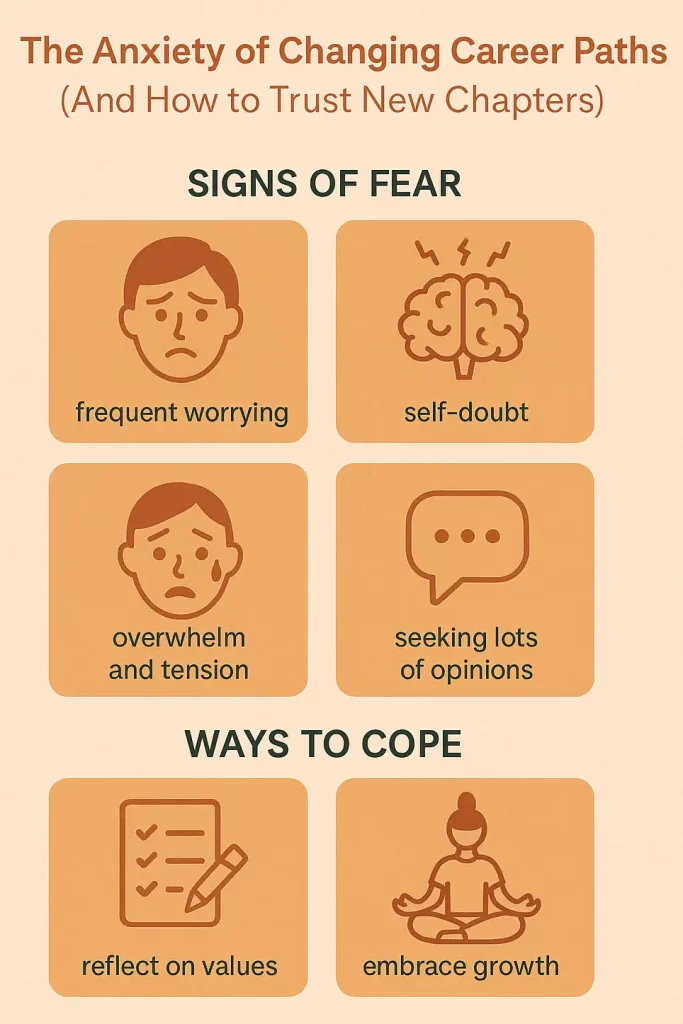You ever lay awake at night, staring at the ceiling, thinking, “What if I quit my job and everything falls apart?” Or maybe you’re stuck in a role that feels like it’s sucking your soul, but the thought of starting over makes your stomach knot up like a pretzel. That’s the anxiety of changing career paths, and if you’re nodding along, you’re not alone it’s like a silent epidemic for folks in their 20s and 30s.
We’ll explore why switching directions feels so terrifying, how perfectionism amps up the fear, and gentle ways to reframe those shifts as exciting new chapters instead of total failures. We’ll cover the roots of this anxiety, real-life stories to make it relatable, and practical steps to loosen its grip. For more on handling big life shifts, check out our post on The Fear of Intimacy: When Closeness Feels Unsafe. And Psychology Today has a solid piece on why career changes scare us so much. Plus, we’ve got an interactive quiz coming up to help you gauge your career anxiety level take it to see if it’s time for a shift. Ready to ease that knot in your gut?

What’s Career Change Anxiety, Anyway?
Career change anxiety is that gut-wrenching fear you get when thinking about switching jobs or fields. It’s not just nerves about the unknown it’s a mix of doubt, perfectionism, and “what if” scenarios that keep you stuck. For many in their 20s and 30s, it’s like being at a buffet of possibilities but too scared to try a new plate because what if it’s gross?
This anxiety shows up in sneaky ways: procrastination on job apps, endless scrolling through LinkedIn, or even sabotaging your current role because you’re too afraid to leap. According to a 2023 survey by LinkedIn, over 50% of young professionals feel anxious about career shifts, often fearing financial instability or judgment from family and friends. It’s like your brain’s wired to see change as a threat, not an opportunity.
Anxiety of changing career paths
For me, it hit when I was 28, stuck in a marketing job that paid okay but left me feeling empty. I’d daydream about starting a freelance writing gig, but then the “what ifs” would flood in: What if I fail? What if I regret leaving? It was like my brain was playing a horror movie on loop. But understanding why this anxiety happens was the first step to trusting new chapters.

Why Changing Careers Feels So Overwhelming
Changing careers isn’t just a job swap it’s like rewriting your story, and that can be terrifying. Here’s why it feels so heavy:
- Financial Fears: Money’s a big one. Leaving a stable paycheck for the unknown can feel like jumping without a net. I remember staring at my bank account, thinking, “What if I can’t pay rent?” That fear kept me stuck for months.
- Identity Crisis: Your job’s often tied to who you are. If you’ve spent years building a career as a teacher or engineer, switching can feel like losing part of yourself. Harvard Business Review says this identity shift is a major source of anxiety, especially if your family or friends see you as “the [insert job here] person.”
- External Pressure: Society loves to judge. Family might say, “But you studied so hard for this!” or friends might think you’re crazy for leaving a “good job.” It’s like everyone’s got an opinion on your life except you.
- Fear of Regret: The “what if I hate the new path?” question can paralyze you. It’s like your brain’s playing fortune teller, predicting all the ways it could go wrong.
I felt this when I finally quit marketing for writing. My parents were like, “But you have a steady job!” and my friends thought I was nuts. But looking back, that fear was just my brain trying to keep me safe in the familiar, even if it was making me miserable

How Perfectionism Amplifies Career Anxiety
Perfectionism’s like a sneaky sidekick to career change anxiety it makes everything feel high-stakes. If you’re a perfectionist, you might think there’s one “right” path, and deviating means failure. That pressure can paralyze you, turning simple decisions into endless loops of second-guessing.
- One Right Path Myth: Perfectionists often believe there’s a perfect career waiting, and anything less is a waste. But life ain’t like that careers are messy, with twists and turns.
- External Validation Trap: You might chase jobs for prestige or approval, not passion. I stayed in marketing because it sounded impressive at parties, but it was killing my soul.
- Over-Researching: You read every article, take every quiz, but never make a move. It’s like analysis paralysis on steroids.
- Fear of Regret: Perfectionists hate mistakes, so the idea of changing careers feels like risking a big one.
I was a classic perfectionist. I’d spend hours on Glassdoor, reading reviews for jobs I wasn’t even applying to, worried I’d pick the “wrong” one. It wasn’t until I realized perfection’s an illusion that I could move forward. MindBodyGreen says letting go of perfectionism opens up more opportunities, not less.
The Brain’s Role in Career Change Fear
Your brain’s not out to get you it’s just trying to keep you safe. When you consider a career change, it triggers the amygdala, your fear center, making uncertainty feel like danger. This is left over from our cave days, when change could mean starvation. Now, it’s like your brain’s saying, “Stick with the known it’s safer!”
The nervous system loves predictability. Changing careers means stepping into the unknown, which can spike cortisol (stress hormone) and make you feel wired. Positive Psychology says this resistance is normal, but you can rewire it with mindfulness.
For me, this fear showed up as endless “what ifs.” What if I fail? What if I regret it? But remembering my brain was just protecting me helped me push through

Reframing Career Changes as Seasons
Careers aren’t linear they’re like seasons. You have your spring (learning and growing), summer (thriving), fall (winding down), and winter (resting or shifting). Changing paths isn’t failing it’s just moving to a new season.
This mindset helped me when I left marketing. I told myself, “That job was my summer, but now it’s fall, and it’s time for something new.” It made the change feel natural, not scary. Forbes says reframing change as growth reduces anxiety and opens doors.
Anchoring Into Your Why
When anxiety hits, anchor into your “why.” Why do you want this change? What’s no longer working in your current path? Write it down:
- What’s draining me now?
- What excites me about the new direction?
- What values feel out of alignment?
I did this when I was debating leaving my job. My “why” was freedom and creativity, which marketing wasn’t giving me. Seeing it on paper made the fear feel smaller.

Normalizing Learning Curves
New paths come with bumps skill gaps, mistakes, feeling like a newbie. But that’s normal! Expect imperfection, and give yourself grace. I was terrible at freelancing at first missed deadlines, undercharged clients but I learned, and it got better.
Harvard Business Review says embracing the learning curve builds resilience and makes change less scary.
Building Safety Nets
Change is less scary with a net. Save some money, line up mentorship, or test the waters part-time. I freelanced on the side before quitting, and it made the leap feel doable.
Financial cushions, like an emergency fund, can ease the fear. Even if you can’t build a big one, starting small helps.
Detaching Career from Core Identity
Your job isn’t who you are. You’re more than your title you’re a friend, a creative, a dreamer. Detaching your identity from your career makes change feel less like losing yourself.
I used to say, “I’m a marketer,” like it defined me. Now, I say, “I do marketing, but I’m also a writer and hiker.” It makes shifting paths feel exciting, not existential. BetterUp says this mindset shift reduces fear and opens new possibilities

The LGBTQ+ Perspective on Career Anxiety
For folks in the LGBTQ+ community, career change anxiety can feel even heavier. Navigating discrimination, identity struggles, or unsupportive workplaces can make switching paths feel riskier. A queer friend of mine said they stayed in a toxic job because they feared facing bias in a new one. It was like the fear of change was compounded by the fear of rejection.
Finding affirming networks, like LGBTQ+ professional groups or mentors, can help. My friend joined a queer business network and got advice on navigating changes safely. If you’re part of the community, seek out spaces where you can be yourself without fear it’s like a safety net for your career dreams. 😊

The Science Behind Career Change Anxiety
Your brain’s wired to hate change. The amygdala, your fear center, sees uncertainty as a threat, releasing cortisol and making you feel stressed. This is left over from evolution, when change could mean danger.
Perfectionism amps it up by activating the prefrontal cortex, which overthinks every option. A 2019 study in Journal of Vocational Behavior found that perfectionists report higher career anxiety because they fear failure.
But here’s the good news: mindfulness can calm the amygdala. A 2017 meta-analysis in JAMA Internal Medicine showed mindfulness reduces anxiety by 30%. Practices like deep breathing or journaling can rewire your brain to see change as opportunity, not threat.
Here’s the data:
| Impact | Statistic | Source |
|---|---|---|
| Anxiety Reduction | 30% decrease with mindfulness | JAMA Internal Medicine |
| Heart Disease Risk | 67% increase with chronic stress | Bradley University Counseling Center |
| Perfectionism and Anxiety | Higher in career changers | Journal of Vocational Behavior |
Other articles that will definitely help you
Your brain’s not out to get you it’s just trying to keep you safe. But with practice, you can teach it change is okay.

FAQ
Rarely will it feel 100% safe. Ask: “Is staying hurting me more than the risk of changing?” If yes, it’s time.
Most choices aren’t forever. Skills transfer, and you can always adjust. Regret’s part of growth, but staying stuck often leads to bigger regrets.
Nope! Honoring your path makes you happier and more giving in the long run. Your loved ones want you fulfilled, not miserable.
Society pushes linear success stories, but careers are messy. Reframe it as evolution, not failure.
Listen to what excites you, not what scares you. If the new path feels alive, that’s your sign.

How to Start Trusting New Chapters
- Reframe Your Story: Write down, “This change is a new chapter, not a failure.”
- Anchor Your Why: List what’s wrong with your current path and what’s exciting about the new one.
- Embrace Imperfection: Tell yourself, “It’s okay to learn on the way.”
- Build a Safety Net: Save money or find a mentor before leaping.
- Detach from Identity: Remind yourself, “I’m more than my job.”
- Practice Mindfulness: Do a 5-minute breathing exercise when anxiety hits.
- Celebrate Wins: Note small steps, like applying to a job, and pat yourself on the back.
Conclusion
Changing career paths can feel like jumping off a cliff, but it’s not failure it’s growth. That anxiety? It’s your brain trying to keep you safe in the familiar, but sometimes the familiar’s what’s holding you back. By reframing change as a season, anchoring into your why, and building safety nets, you can trust those new chapters without the panic.
You’re not selfish for wanting more you’re brave. So, what’s your first step? Maybe journaling your “why” or talking to a friend about your dreams. You’ve got the resilience to adapt; now it’s time to leap. 😊

Citations:
- Psychology Today – Why We Fear Change (Including Careers): Explores why our brains resist change preferring comfort over uncertainty and how avoidance may block growth .
- Harvard Business Review – Prioritize Happiness When Changing Jobs: Offers research-backed strategies like managing expectations and avoiding rash decisions to support career transitions with less anxiety .
- LinkedIn – Work Change Report (2025): Reveals that 58% of people worldwide plan to explore new jobs in 2025, though many report the job market has become significantly harder .
- Forbes – Why Clinging to Control May Be Sabotaging Your Leadership: Points out that over-control from leaders can suppress innovation and reduce team empowerment and initiative .
- BetterUp – How Coaching Improves Mental Health: Demonstrates via research that coaching significantly enhances mental fitness, which can reduce anxiety including the kind related to career changes
Don’t miss related articles
- The Fear of Intimacy: When Closeness Feels Unsafe
- The Subtle Exhaustion of Always Being ‘The Strong One’
- The Exhaustion of Constant Micro-Decisions
- The Fear of Setting Boundaries
- The Strange Guilt of Having Needs
- Fear of Starting Over in Life
✨ Last updated on 11.08.2025











Leave a Reply